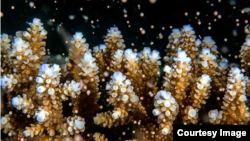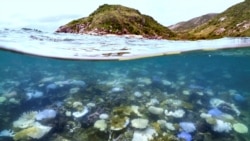Scientists say they have successfully reproduced corals to improve their resistance to warmer ocean temperatures.
The latest effort is one of many that seeks to prevent major coral destruction events known as bleaching. The scientists blame the bleaching on ocean warming caused by climate change.
Coral bleaching happens when the small ocean animals react to climate pressures by releasing algae organisms that provide them with energy and give them their color. If the bleaching is severe and long-lasting, corals can get sick and die.
Scientists and environmental officials have warned major bleaching events are currently affecting ocean coral collections in many areas across the world. Many researchers link the continued warming of Earth’s oceans to climate changes related to human activities.
In April, the U.S. National Oceanic and Atmospheric Administration (NOAA) and International Coral Reef Initiative said at least 53 countries, territories, or local economies reported ongoing bleaching events since February 2023.
The latest research aimed to reproduce corals that can become more resistant to warm ocean temperatures. To do this, the researchers used a method known as selective breeding. Scientists have long used this method to produce animals and plants with more desirable characteristics.
This process can produce living things that are better able to deal with, or tolerate, different environmental conditions. Selective breeding is now a main method used by scientists to study how the process can prevent ocean warming from killing off corals.
The new research was led by scientists at Britain’s Newcastle University. The team recently reported their findings in a study appearing in the publication Nature Communications. The study said their selective breeding methods resulted in improved heat tolerance of adult corals, even within a single generation.
Scientists have for years been observing corals that show more heat-resistant qualities. These corals are used as the parents for new corals.
The researchers said their experiments showed that breeding heat-tolerant characteristics into different corals could be a useful tool “to improve population resilience.” However, the team noted the method would likely not be enough by itself to effectively protect corals. This is because increasingly intense ocean warming is expected to continue if additional steps are not taken to reduce the worldwide effects of climate change.
The scientists noted, therefore, that methods to reproduce heat-resistant corals must be a part of overall efforts that require “urgent climate action.”
The research team’s experiments were carried out during a five-year project launched by Newcastle’s James Guest. The effort received financial support from the European Research Council.
The team said it carried out selective breeding tests involving two different characteristics. The first sought to improve the tolerance to the release of a short, intense heat event – over 10 days with a temperature rise of 3.5 degrees Celsius. The second tested results for a less intense, but long-term temperature rise of 2.5 degrees Celsius over one month.
The study found that “selecting parent colonies for high rather than low heat tolerance increased the tolerance of adult offspring." The result was observed for corals experiencing either a short, intense heat event or a long-term temperature rise.
The team estimated that about 25 percent of the increased heat tolerance was linked to genes passed down from parents of the corals. These genes can also be influenced by other selective breeding methods to produce heat-tolerance characteristics, the researchers said.
Newcastle researcher Liam Lachs helped lead the study. He said in a statement the research clearly demonstrated that selective breeding can be a valuable tool in improving the health of corals influenced by warming oceans. However, he noted the tested methods are not a complete solution and that “more research is needed to maximize” breeding results.
The researchers said they plan next to lead efforts to carry out large experiments on corals in the wild to confirm the study results. These efforts would involve seeding selectively bred corals directly on ocean reefs, or deploying corals raised in a laboratory.
I’m Bryan Lynn.
Bryan Lynn wrote this story for VOA Learning English, based on reports from Newcastle University, Nature and The Conversation.
_________________________________________
Words in This Story
coral – n. a hard, usually pink or white substance produced by a type of very small sea animal
algae – n. usually small plants that grow in or near water and do not have typical leaves of roots
characteristic – n. a typical quality that makes one person or thing different from others
resilient – adj. strong enough to get better quickly after suffering damage from illness, shock, etc.
maximize – v. to increase something as much as you can
reef – n. a collection of rocks or coral or a ridge of sand at or near the surface of water







Forum